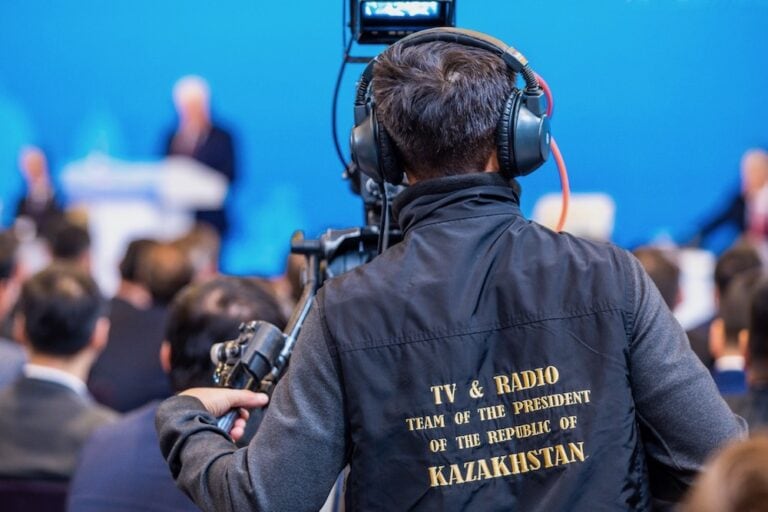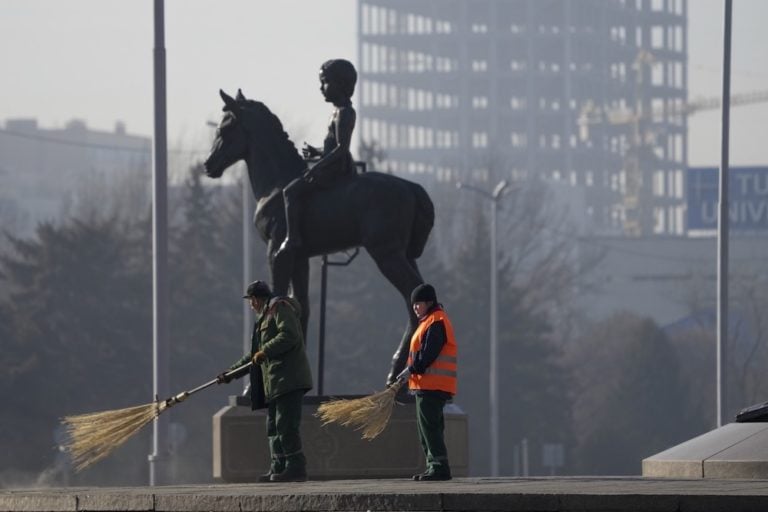Zinaida Mukhortova has been detained, off and on, since February 2010, after she wrote a letter to the president of Kazakhstan to complain about interference by a member of parliament in a civil case in which she was involved.
Kazakh authorities should immediately release a lawyer from unlawful, forced psychiatric detention and ensure her safety, Human Rights Watch says. They should give the lawyer immediate access to her legal representative and take steps to hold accountable all those responsible for her unlawful detention. A civil court hearing to consider Zinaida Mukhortova’s forced hospitalization has been scheduled for August 16, 2013.
Mukhortova has been detained, off and on, since February 2010, including at least twice in psychiatric hospitals, after she wrote a letter to the president of Kazakhstan to complain about interference by a member of parliament in a civil case in which she was involved.
“Each and every minute Zinaida Mukhortova is kept unlawfully locked up in a psychiatric hospital, her fundamental rights are being gravely violated,” said Mihra Rittmann, Central Asia researcher at Human Rights Watch. “The authorities should free Mukhortova immediately.”
The authorities should also hold accountable officials responsible for unlawfully detaining Mukhortova, Human Rights Watch said.
Mukhortova, 56, was detained on August 9 and forcibly admitted to the psychiatric hospital in Balkhash. Her lawyer told Human Rights Watch that Mukhortova’s sister saw four police officers and several medical personnel take Mukhortova away. On August 12 the hospital’s head doctor barred Mukhortova’s legal representative, Amangeldy Shormanbaev, from meeting with her and refused to explain the grounds for her detention.
Shormanbaev, a human rights lawyer, said that there are no grounds for Mukhortova’s forced detention. Neither Mukhortova nor Shormanbaev had been informed at the time she was detained of any court order for her forced detention in a psychiatric hospital.
On August 9, upon hearing that his client had been detained, Shormanbaev filed a criminal complaint with the prosecutor’s office in Balkhash for “unlawful deprivation of freedom” and “unlawful detention in a psychiatric institution.”
On August 12 Shormanbaev attempted to visit Mukhortova at the psychiatric hospital. Although by law the hospital has no grounds to deny Mukhortova the right to meet with her legal representative, the head doctor refused to let Shormanbaev meet his client and without further explanation told him to “go to the prosecutor’s office.” Later that day Shormanbaev filed a new complaint at the prosecutor’s office in Balkhash about Mukhortova’s unlawful forced detention, and on August 13 he filed a similar complaint with the regional prosecutor’s office in Karaganda.
“The authorities can’t claim the rule of law functions in Kazakhstan when it is possible for Mukhortova to be arbitrarily snatched from her home, forced into psychiatric detention without due process, and then prevented from meeting her lawyer,” Rittmann said. “This is a blatant violation of both Kazakh and international law.”
Mukhortova’s legal troubles began in September 2009, when she wrote a letter to the president of Kazakhstan complaining about a member of parliament interfering in a civil case in which she was involved at the time. Soon after, authorities charged her and three others who had signed their name to the letter with “spreading misleading information” under article 351, part 2 of Kazakhstan’s criminal code. In late February 2010, during the trial, Mukhortova was taken into custody, forced to undergo a psychiatric evaluation, and was later diagnosed with a “chronic delusional disorder.”
In August 2010 the Balkhash City Court ruled that since she had been found mentally incompetent, she should be relieved of criminal responsibility and undergo forced psychiatric treatment. The three others were given suspended sentences.
In January 2011 Mukhortova was sent to the Republican Specialized Psychiatric Hospital in Aktas for treatment. She spent approximately nine months there.
In a video interview posted online in November 2011 by Andrei Tsukanov, a civil society activist in Kazakhstan, Mukhortova stated that she was ill-treated by the hospital staff: “They gave me two pills – I didn’t know what the pills were – without even checking my reaction to these pills… and when I refused [to swallow them], they beat me and… tied my legs and hands to the bed.”
In September 2011 the terms of Mukhortova’s treatment were changed by court order. Mukhortova was released and allowed to return to Balkhash. However, in mid-December 2011, she was forcibly admitted to the psychiatric hospital in Balkhash and held there for approximately two weeks.
In 2012 Mukhortova filed a complaint against the hospital’s head doctor for unlawfully subjecting her to psychiatric detention. By July 2013 judicial review of the complaint had reached the Supreme Court, which declined to consider the complaint. Two human rights activists familiar with Mukhortova’s case told Human Rights Watch they are concerned that her current detention is retaliation for this complaint.
Meanwhile, Mukhortova had appealed the original criminal court finding against her. Based on her appeals, on July 26, 2012, the Balkhash City Court issued a decision releasing Mukhortova from criminal liability for the charge of ”spreading misleading information” and ordering authorities not to subject her to any more forced medical treatment.
In September 2012 Mukhortova underwent an independent psychiatric assessment arranged by a local independent human rights group. The expert concluded that Mukhortova “did not suffer and does not suffer from any mental disorders either during the period of the alleged [criminal] acts or now.”
Involuntary detention on mental health grounds should only be possible in exceptional circumstances clearly defined in law, based on a determination by qualified health care professionals that a person poses a serious and imminent risk to themselves or to a third party, Human Rights Watch said. That determination must be subject to review by an independent authority. Forced detention and treatment in any other circumstances is a violation of the right to liberty and security as guaranteed by article 9 of the International Covenant on Civil and Political Rights (ICCPR), to which Kazakhstan is a party.
In addition to a violation of the right to liberty and security, forced psychiatric treatment may also constitute inhuman treatment and even torture in violation of article 7 of the ICCPR. This is particularly so when psychiatric detention and treatment are used, as appears to be the case of Mukhortova, as a form of punishment, in the absence of any medical justification.
The United Nations special rapporteur on torture stated in his 2013 report on abuses in health care settings, “The evidence shows that [this] arbitrary and unjustified detention is frequently accompanied by – and is the setting for – egregious physical and mental abuse.”
“There is no justification for keeping Mukhortova locked up another minute,” Rittmann said. “The authorities should immediately make sure she’s released, and prevent this from ever happening again.”

A screenshot of Kazakh lawyer Zinaida Mukhortova, from an interview conducted in 2011.Андрей Цуканов/Youtube


